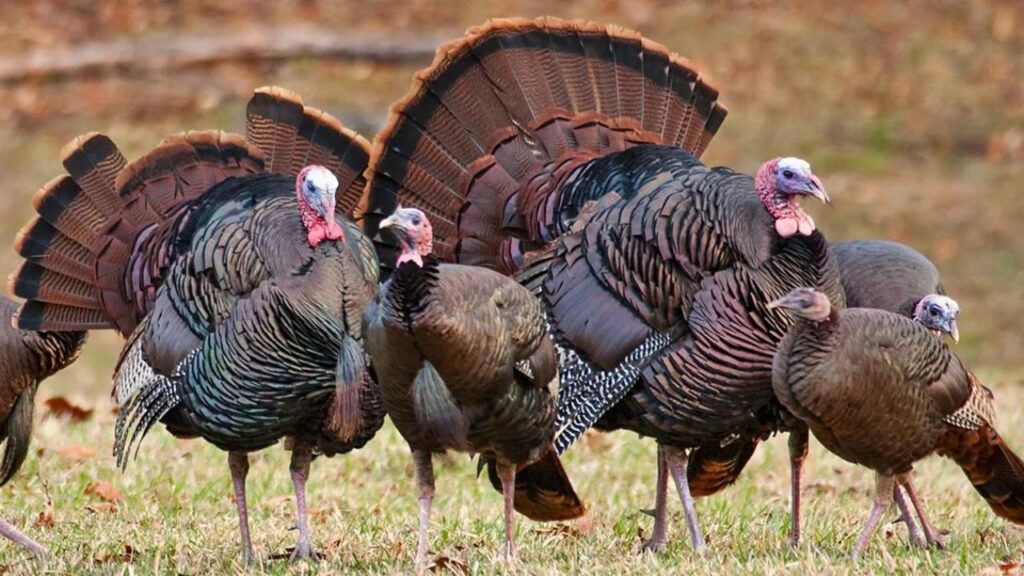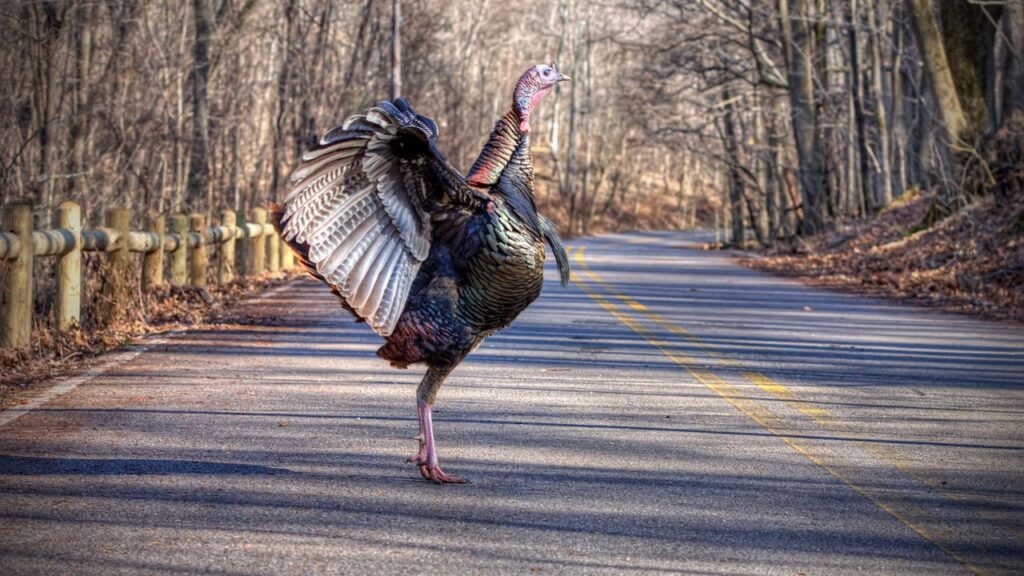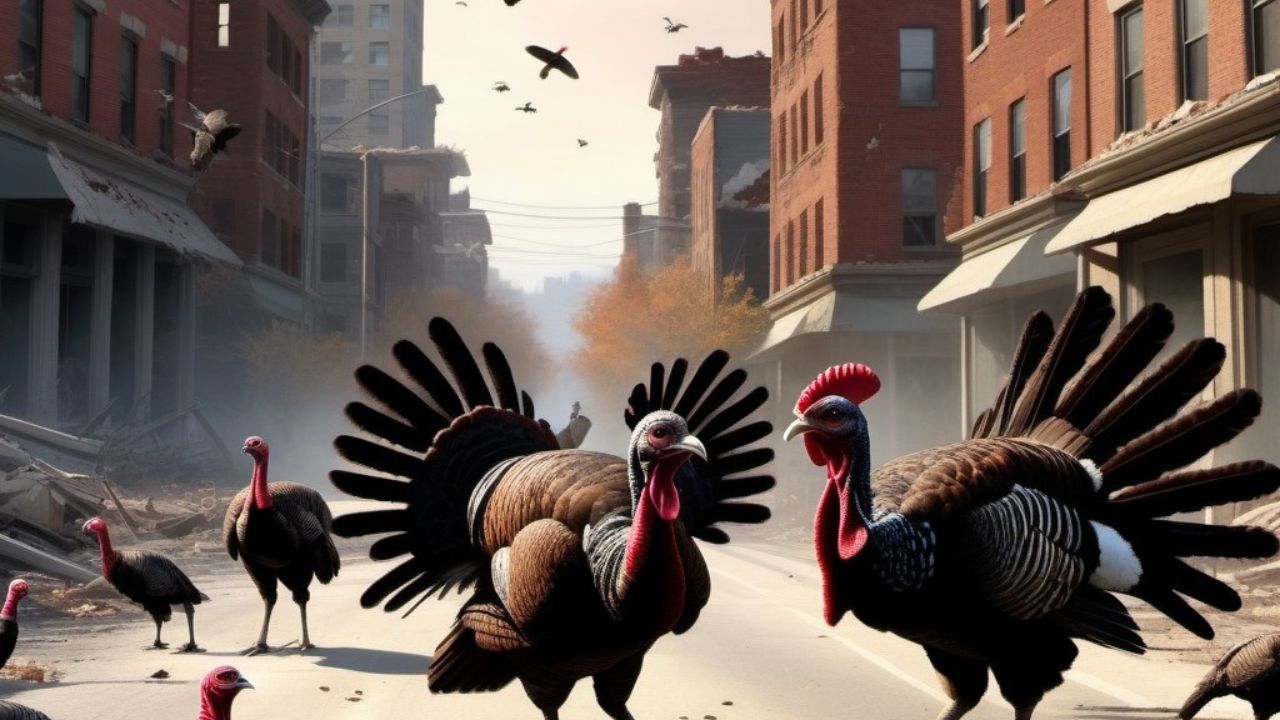Do Turkeys Attack Humans? Turkeys can become aggressive towards humans, especially during mating season, when they feel threatened or are protecting their territory.
Turkeys are large, impressive birds native to North America, known primarily for their role as a Thanksgiving staple.
Wild turkeys, in particular, have grown more visible as urban sprawl continues, bringing human populations into closer proximity with these wildlife creatures.
While generally shy and non-confrontational, there have been occasional reports of turkeys attacking humans, leading some to wonder: Do turkeys attack humans? And if so, why?
In this article, we’ll dive into the behavior of wild turkeys, explore the circumstances under which they may become aggressive, and provide advice on how to stay safe during an encounter with these birds.
By the end of the article, you’ll have a clearer understanding of turkey behavior and practical tips to avoid any trouble with these feathered creatures.
Contents
What Are Turkeys?
Physical Characteristics of Wild Turkeys
Wild turkeys are much larger than most people realize, with adult males (toms) typically weighing between 16 and 24 pounds, and females (hens) around 8 to 12 pounds.
They are about 3 to 4 feet tall and have a wingspan of up to 5 feet. [Do Turkeys Attack Humans?]
Toms, in particular, are known for their striking appearance, which includes iridescent plumage, a distinctive fan of tail feathers, and fleshy appendages like the snood (a flap of skin hanging over their beak) and wattles (the fleshy part under their chin).
They also have sharp spurs on their legs that can be used for defense. [Do Turkeys Attack Humans?]
Typical Behavior of Wild Turkeys
Wild turkeys are generally shy creatures, preferring to live in forests and open woodlands. They forage on the ground, feeding on a diet of seeds, insects, and small vertebrates, but can also fly short distances, often to roost in trees.
They are social animals, living in flocks that range in size depending on the time of year. Despite their imposing size, wild turkeys are usually non-aggressive and will typically flee when approached by humans.
However, human encroachment into their habitats, along with the practice of feeding wild turkeys, has led to behavioral changes in some populations. In certain situations, turkeys may lose their natural fear of humans, leading to potential conflicts.

Do Turkeys Attack Humans?
Although turkeys are not naturally aggressive toward humans, there are instances where they may attack. The reasons behind turkey aggression typically fall into several key categories.
When Turkeys Feel Threatened
Like most animals, turkeys are protective of themselves and their young. If they perceive a human as a potential threat and feel cornered or unable to escape, they may lash out defensively.
This defensive aggression usually involves pecking with their sharp beaks, flapping their wings, or using their spurs to strike at the perceived threat.
In most cases, a turkey attack is more about scaring away the perceived danger than causing harm. [Do Turkeys Attack Humans?]
Territorial Instincts During Mating Season
One of the most common times for aggressive turkey behavior is during mating season, typically in the spring. [Do Turkeys Attack Humans?]
During this time, male turkeys become highly territorial and are more likely to display aggressive behavior toward perceived rivals, including humans.
Mating season, also known as the breeding season, brings out heightened levels of testosterone in male turkeys, making them more likely to challenge anything that enters their domain.
During this period, toms will puff up their feathers, fan out their tails, and strut around to impress hens and assert dominance over other males. [Do Turkeys Attack Humans?]
They may mistake humans, particularly those wearing dark or shiny clothing, as rivals. This could result in charging, pecking, or striking with their wings or spurs.
Human and Urban Interactions
As urban areas continue to expand into wild habitats, more and more people are encountering wild turkeys in their neighborhoods, parks, and even backyards.
This increased interaction can lead to more frequent turkey confrontations, especially when people start feeding the birds.
Feeding wild turkeys can create problems because it makes the birds less wary of humans, and they may start associating people with food.
In these situations, turkeys may approach people more frequently and aggressively, especially if they feel their “territory” is being invaded. [Do Turkeys Attack Humans?]
In urban settings, turkeys may also become bolder and more aggressive simply because they are unaccustomed to natural predators.
Without the threat of natural predators like coyotes or foxes, turkeys can become more dominant and less fearful, making them more likely to confront humans.
Common Warning Signs of Turkey Aggression
Before a turkey attacks, it will often display warning signs that indicate it is feeling threatened or territorial.
Understanding these warning signs can help prevent an encounter from escalating into an attack. Some common signs of turkey aggression include:
- Puffing up their feathers to make themselves appear larger
- Fanning their tail feathers, a sign of dominance
- Charging or moving quickly toward a person
- Loud gobbling or clucking to warn off potential threats
If you notice a turkey exhibiting these behaviors, it’s best to back away slowly and avoid further provoking the bird.

Are Turkey Attacks Dangerous?
Physical Impact of Turkey Attacks
While turkey attacks can be alarming, they are rarely dangerous. The physical impact of a turkey attack typically involves pecking, scratching with their claws, or being struck by the bird’s wings.
Male turkeys may also use their spurs to strike, which can cause puncture wounds or scratches. In rare cases, these injuries could become infected if not treated, but serious harm from a turkey attack is uncommon.
It’s important to note that while turkeys can inflict minor injuries, their primary goal is usually to scare away the perceived threat rather than cause harm.
Most turkey attacks are brief, ending once the bird feels that the intruder has been sufficiently driven off. [Do Turkeys Attack Humans?]
How Common Are Serious Injuries?
Serious injuries from turkey attacks are exceedingly rare. In the vast majority of cases, victims of turkey attacks report minor scratches, bruises, or the occasional peck.
Most injuries occur when individuals trip, fall, or injure themselves while trying to flee from the bird. [Do Turkeys Attack Humans?]
For small children, the elderly, or those with limited mobility, turkey attacks may pose a slightly higher risk, but overall, such incidents are uncommon.
How to Avoid Turkey Attacks
Fortunately, there are several simple steps you can take to avoid an aggressive encounter with a turkey. [Do Turkeys Attack Humans?]
Avoid Feeding Wild Turkeys
One of the most important things to remember is not to feed wild turkeys. Feeding these birds can encourage them to lose their natural fear of humans and become more aggressive.
If turkeys begin to associate people with food, they may approach humans more frequently, expecting to be fed. When they don’t receive food, their behavior may become increasingly bold or aggressive.
Keep a Safe Distance
Always maintain a safe distance from wild turkeys. While they are impressive to observe, getting too close can trigger defensive or territorial behaviors.
If you encounter a turkey in the wild, keep at least 30 to 50 feet away. If the turkey begins to move toward you, back away slowly, facing the bird but avoiding direct eye contact, which could be perceived as a challenge.
Understanding Their Behavior in the Wild
Understanding turkey behavior is key to avoiding negative encounters. Wild turkeys are not naturally inclined to attack humans, but they will defend their territory and themselves if they feel threatened. [Do Turkeys Attack Humans?]
During mating season, when males are particularly territorial, it’s especially important to give turkeys extra space and avoid provoking them with loud noises, sudden movements, or shiny objects that could be mistaken for rivals.
What to Do if a Turkey Approaches Aggressively
If a turkey approaches you aggressively, remain calm and assertive. Do not turn your back or run away, as this may encourage the bird to chase you. Instead, face the turkey and use your body language to assert dominance.
Make yourself appear larger by raising your arms or holding up an object like a backpack or umbrella. Speak in a firm, loud voice to scare the bird away. Most turkeys will retreat once they realize you’re not intimidated.
In the rare event that a turkey continues to be aggressive, consider using a deterrent like a loud noise or a spray of water from a hose to drive the bird away. Avoid physical confrontation unless absolutely necessary, as this could further provoke the turkey.
Final Verdict
In summary, while turkeys are generally peaceful animals, they can become aggressive toward humans under certain circumstances, particularly when they feel threatened or during mating season.
Turkey attacks are usually not dangerous, though they can cause minor injuries. [Do Turkeys Attack Humans?]
By respecting wild turkeys’ space, avoiding feeding them, and being aware of their behavior, you can greatly reduce the risk of an aggressive encounter.
See Also: Do Guinea Fowl Attack Humans? The Silent Stalkers!
FAQs
Can domestic turkeys become aggressive?
Yes, domestic turkeys can occasionally show aggression, particularly males during the breeding season. However, domestic turkeys are generally more accustomed to humans and less likely to attack.
How should you react if a turkey attacks you?
If a turkey attacks, stand your ground and use your presence to assert dominance. Make yourself appear larger by raising your arms or an object like a backpack, and use a loud voice to deter the bird. Do not turn your back or run away.
What is the best way to deter aggressive turkeys?
To deter aggressive turkeys, avoid feeding them and maintain a safe distance. If confronted by an aggressive turkey, use loud noises or water to scare the bird away.
Do turkeys attack pets or other animals?
While turkeys may exhibit territorial behavior toward smaller animals, attacks on pets are rare. Larger animals like dogs may provoke defensive behavior in turkeys, but direct attacks are uncommon.
Are turkey attacks more common in urban areas?
Yes, turkey attacks are more likely to occur in urban or suburban areas where wild turkeys have become habituated to human presence. In these areas, turkeys may lose their natural fear of humans and become more aggressive.
Conclusion: Do Turkeys Attack Humans?
Although turkeys may occasionally attack humans, these incidents are rare and typically involve defensive behavior.
By understanding turkey behavior, especially during mating season, and avoiding direct interaction with wild turkeys, you can minimize the risk of an encounter.
Turkeys are remarkable creatures, and with a little respect for their space, humans and turkeys can coexist peacefully.

Hello, I am Rosa Ellis, a mother of two and a wildlife blogger. I grew up in New York City, but I love exploring forests. I’ve traveled to places like Yellowstone National Park and the Amazon Rainforest to see animals up close. I know a lot about animal behavior and which animals can be dangerous to humans. Thanks for visiting my blog!

